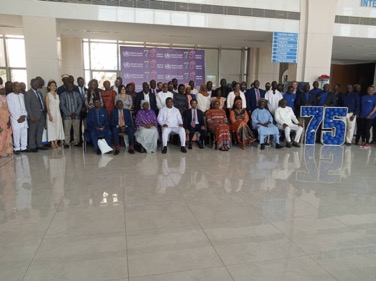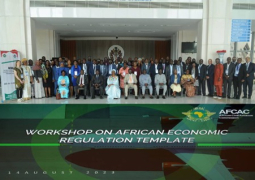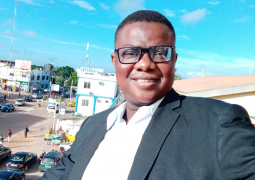
It would be recalled that in 1948, countries of the world came together and founded WHO to promote health, keep the world safe and serve the vulnerable – so everyone, everywhere can attain the highest level of health and well-being. Thus, the event provides a perfect opportunity to look back at public health successes that have improved quality of life during the last seven decades, as well as to motivate action to tackle the health challenges of today ̶ and the future.
At the event, Dr Desta Tiruneh, representative of the World Health Organisation Gambia Office, expressed gratitude to the government of The Gambia, representatives of Member States of WHO, colleagues from the United Nations system, donor partners and those who all played a part in contributing to the success of the institution over the years possible.
“Your unwavering commitment and tireless efforts have made a significant difference in the lives of people around the globe. Over the years, the WHO has made remarkable strides in improving health outcomes, tackling global health challenges and shaping the future of health care. Through its relentless dedication to serving humanity, WHO has built trust as a guardian of public health that provides critical support to countries in time of crisis and ensuring the well being of billions around the world.”
Dr. Tiruneh acknowledged that WHO has been instrumental in strengthening health systems, promoting universal health coverage and advocating for equitable access to lifesaving medicines and vaccines.
“WHO’s impact extends far beyond emergencies and outbreaks. It continuously strives to tackle the most pressing global health issues from promoting mental health and reducing non-communicable diseases among a host of others.”
WHO country rep spoke highly of the gains registered by WHO alongside their development partners, saying through their improved public health emergency response mechanism, they have witnessed swift detection and containment of outbreaks.
This progress, he added, has been possible because of their collaborative work with stakeholders, by developing emergency response guidelines, training of experts and establishing rapid response teams.
For her part, United Nations Resident Coordinator in The Gambia, said the day is a moment to reflect and celebrate the extra-ordinary journey of WHO over the past 75 years and its remarkable contribution to global health.
“In this time, WHO has been a beacon of hope, a symbol of global cooperation and a guardian of public health. WHO played an instrumental role in addressing and mitigating numerous health emergencies, crisis and pandemics worldwide.”
She noted that ‘as we embark on this momentous occasion’ it is important to acknowledge the significant milestones in WHO’s journey.
She recalled that from its inception in 1948, WHO has tirelessly endeavoured to fulfil its mission; the attainment of the highest possible level of health for all people.
“One of the most outstanding achievements was the eradication of small pox in 1980, a feat that will forever be etched in the annals of global health history. This groundbreaking achievement showcased the power international collaboration and paved the way for future efforts to combat deadly diseases.”
In his statement, Dr. Ahmadou Lamin Samateh, minister for Health, commended WHO for its remarkable achievements registered over the years in improving global health outcomes worldwide.
He equally thanked WHO country office for all the support and being a good partner to the Ministry, further acknowledging all this achievement in the country wouldn’t have been possible without the support of Country team under leadership of Dr Desta Tiruneh, who he said, has been at the fore front in the country’s response to Covid 19, measles and Acute Kidney Injury outbreaks.
He spoke at length on the numerous support rendered by the UN organisation both in kind and cash during the height of the Covid19 pandemic. This, he added, had led to the renovation and equipping at Ndemban Clinic in Bakau.
To that end, Dr. Samateh renewed the call in addressing health inequities in the face of unprecedented challenges.
Minister Samateh also called for more funding at country offices, rather than concentrating the support at global and regional levels. This, he believes, would make WHO more effective collectively and respond to targeted health care need of the people. “This will be more tactical so that countries can continue to benefit more.”
Minister Samateh lamented on universal health coverage, strengthening surveillance and pandemic preparedness, but that would be far-fetched reality without addressing health inequities.





